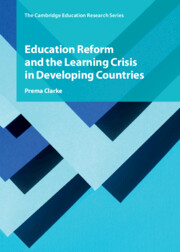Book contents
- Education Reform and the Learning Crisis in Developing Countries
- Education Reform and the Learning Crisis in Developing Countries
- Copyright page
- Contents
- Figures, Tables, and Boxes
- Acknowledgments
- Introduction
- 1 The Learning Crisis
- 2 Donor Programming in Education
- 3 Best Practice and Research in Education
- 4 Creating an Evidence Base for Learning
- Epilogue
- Index
- References
3 - Best Practice and Research in Education
Published online by Cambridge University Press: 08 September 2022
- Education Reform and the Learning Crisis in Developing Countries
- Education Reform and the Learning Crisis in Developing Countries
- Copyright page
- Contents
- Figures, Tables, and Boxes
- Acknowledgments
- Introduction
- 1 The Learning Crisis
- 2 Donor Programming in Education
- 3 Best Practice and Research in Education
- 4 Creating an Evidence Base for Learning
- Epilogue
- Index
- References
Summary
This chapter explores the evidence base that informed the work of donors. It examines the analytical work undertaken in developing countries, mostly financed by multilateral and bilateral agencies. Three trajectories in this body of education research can be identified: (i) large-scale surveys showing broad trends and patterns; (ii) randomized controlled trials claiming to show “what works” in education; and (iii) political economy research. I highlight the strengths and limitations of each of these research tracks, examining to what extent studies were able to inform project design or steer mid-course correction to improve learning. The discussion shows how the predominance of one approach blinds practitioners to the specificities and complexities of the two levels (micro and meso) critical for learning. This also displaces much-needed resources for knowledge generation in the areas that impact learning. In sum, the educational ecosystem in a country, which includes numerous institutions at the micro and meso levels interacting and working together to make a school system function, is a black box.
Keywords
- Type
- Chapter
- Information
- Education Reform and the Learning Crisis in Developing Countries , pp. 103 - 151Publisher: Cambridge University PressPrint publication year: 2022

